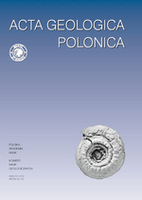
ACTA GEOLOGICA POLONICA
Scope & Guideline
Unveiling Earth's secrets through rigorous scientific inquiry.
Introduction
Aims and Scopes
- Paleontological Studies:
The journal frequently publishes research on fossil records, including studies of ammonites, echinoderms, and other marine organisms, contributing to the understanding of historical biodiversity and ecological changes. - Stratigraphic Analysis:
A significant focus is placed on stratigraphy, including detailed studies of various geological formations, depositional environments, and stratigraphic correlations, particularly within the Cretaceous and Quaternary periods. - Geological Mapping and Tectonics:
Research often includes geological mapping and tectonic studies, investigating the structural geology and tectonic evolution of regions such as the Carpathians and other parts of Central and Eastern Europe. - Environmental Geology and Paleoenvironments:
The journal covers studies related to paleoenvironmental reconstruction, examining past climatic conditions and their impacts on sedimentation and biological communities. - Geochemical and Mineralogical Investigations:
Research involving geochemical analyses and mineralogical studies is common, focusing on the composition and properties of various geological materials and their implications for understanding geological processes.
Trending and Emerging
- Climate Change and Paleoenvironmental Studies:
There is an increasing emphasis on reconstructing past climatic conditions and their impacts on geological formations, reflecting current global concerns about climate change and its historical context. - Interdisciplinary Research Approaches:
Recent publications showcase a trend towards interdisciplinary methods, combining geology with other scientific fields such as biology, archaeology, and environmental science, enhancing the depth of geological research. - Detailed Biostratigraphic Studies:
An uptick in detailed biostratigraphic work, particularly involving ammonites and other microfossils, highlights a growing interest in understanding the temporal and spatial distribution of species through geological time. - Geological Hazards and Urban Geology:
Emerging studies focusing on geological hazards, particularly in urban settings, indicate a trend towards understanding the risks associated with geological processes in populated areas.
Declining or Waning
- Recent Volcanic Studies:
Research focusing on recent volcanic activity and geological phenomena related to volcanism appears to have decreased, suggesting a waning interest or shift towards more historical geological studies. - Human Impact Studies:
While historical human impact on geological formations has been a topic of interest, recent publications indicate a decline in studies specifically addressing anthropogenic effects on geological systems compared to previous years. - Non-Polish Regional Studies:
Research specifically focused on geological studies outside Poland, while still present, has become less prominent, indicating a potential narrowing of focus towards more localized research. - Contemporary Sedimentology:
There has been a noticeable decrease in publications addressing contemporary sedimentological processes, possibly due to a shift towards more historical and stratigraphic analyses.
Similar Journals
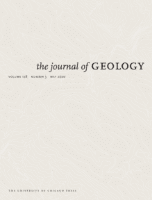
JOURNAL OF GEOLOGY
Charting New Territories in Geological Research.The JOURNAL OF GEOLOGY, published by University of Chicago Press, serves as a premier platform for disseminating groundbreaking research in the field of geology. Established in 1973, this esteemed journal has consistently ranked in the Q2 category in geology, further solidified by its Scopus ranking, where it is positioned at 99 out of 321 in Earth and Planetary Sciences, marking it in the 69th percentile of its category. With an emphasis on innovative and interdisciplinary studies, the journal features peer-reviewed articles that contribute to the understanding of geological processes, earth materials, and environmental interactions. Although it does not currently offer open access, it facilitates broad access through academic institutions to reach a global audience of researchers, professionals, and students striving to advance the knowledge of Earth's history and dynamics. As a vital resource for the geology community, the JOURNAL OF GEOLOGY plays an essential role in fostering scholarly dialogue and advancing both academic inquiry and practical applications in geology.
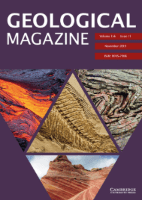
GEOLOGICAL MAGAZINE
Charting the Future of Geological InquiryGEOLOGICAL MAGAZINE, published by Cambridge University Press, is a premier journal in the field of geology, renowned for its rich legacy since 1864 and ongoing contributions to Earth and Planetary Sciences. With an impressive Q1 ranking in Geology and a Scopus rank of #70 out of 321 journals, it holds a significant position within the academic community, appealing to researchers, professionals, and students alike. The journal covers a wide array of topics, ensuring a comprehensive platform for the dissemination of cutting-edge geological research. Although it does not offer open access, it remains a vital resource for those seeking to stay abreast of advancements in the field. With an enduring commitment to quality, GEOLOGICAL MAGAZINE stands as an essential outlet for scholarly communication and serves as a catalyst for academic discourse within the geological sciences.

GEOLOGICA BELGICA
Driving Impactful Research in Earth and Planetary SciencesGEOLOGICA BELGICA is a distinguished open access journal dedicated to advancing the field of Earth and Planetary Sciences, published by Geologica Belgica Luxemburga Scientia & Professionis. With an ISSN of 1374-8505 and E-ISSN of 2034-1954, the journal has been a beacon of knowledge since its establishment in 1998, ensuring the broad accessibility of crucial research findings. Based in Brussels, Belgium, the journal is recognized for its impactful contributions and has achieved a commendable Q2 ranking in the Earth and Planetary Sciences category for 2023. This makes it a vital resource for researchers, professionals, and students alike, encouraging the dissemination of cutting-edge research. Spanning a diverse range of topics within its scope and converging from 2007 to 2024, GEOLOGICA BELGICA remains committed to fostering dialogue and collaboration among earth scientists globally, further enhancing its relevance and influence in this essential field of study.

GEOLOGICAL QUARTERLY
Connecting Minds in Earth Sciences Since 2000.GEOLOGICAL QUARTERLY, published by the Polish Geological Institute, is a respected journal in the field of geology, offering insights into Earth and planetary sciences since its inception in 2000. With an ISSN of 1641-7291 and an E-ISSN of 2082-5099, this journal serves as a vital platform for researchers, professionals, and students seeking to expand their knowledge in geological disciplines. The journal is positioned in Q3 within the geology category as of 2023 and ranks #172 out of 321 in Scopus, placing it in the 46th percentile among its peers. Although currently not an open-access publication, GEOLOGICAL QUARTERLY reflects the policy of fostering scientific communication and collaboration by disseminating valuable geological research. Its commitment to publishing original articles, reviews, and technical notes ensures that it plays a significant role in advancing geological science and its applications within the academic community. With its base in Warsaw, Poland, the journal stands as an important resource for anyone engaged in or studying the Earth sciences.

Swiss Journal of Geosciences
Connecting Researchers to the Heart of Earth ScienceSwiss Journal of Geosciences is a prestigious academic journal dedicated to advancing the field of geosciences, published by SPRINGER INTERNATIONAL PUBLISHING AG. Since its inception in 2007, the journal has established itself as a leading platform for disseminating high-quality research findings in various domains related to Earth and planetary sciences, achieving a notable Q1 ranking in Geology as of 2023. With a solid reputation reflected in its Scopus ranking of Rank #72/321, the journal stands in the 77th percentile within its category. Based in Switzerland, the Swiss Journal of Geosciences embraces an open access model, making it easier for researchers, professionals, and students worldwide to access vital geological research without barriers. The journal’s objectives include promoting interdisciplinary research and fostering insights that address both fundamental and applied geoscientific problems, ensuring it remains a crucial resource for those seeking to understand our planet’s dynamics. Engage with pioneering research and contribute to the vibrant community of geoscientists by exploring the impactful articles published within its pages.
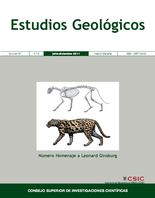
ESTUDIOS GEOLOGICOS-MADRID
Exploring Earth's Mysteries, One Study at a Time.ESTUDIOS GEOLOGICOS-MADRID is a prominent journal in the field of geology, published by the esteemed Consejo Superior de Investigaciones Científicas (CSIC) in Spain. Established in 1976, this Open Access journal has been a vital resource for researchers and professionals since its inception. With an impact factor reflecting its contribution to the Earth and Planetary Sciences community, ESTUDIOS GEOLOGICOS-MADRID currently holds a Q3 category ranking in Geology as of 2023, showcasing its relevance and quality within the discipline. The journal publishes a diverse array of geological studies, ensuring wide-reaching access to significant research findings, thereby promoting collaboration and knowledge sharing. Established as a platform for both foundational research and applied geology, this journal fosters academic growth and contributes to understanding the Earth’s processes. Researchers, professionals, and students are encouraged to explore its extensive archive, which includes publications from 1976 to the present. For more information, visit the journal's editorial office at Editorial CSIC, C/VITRUVIO 8, 28006 MADRID, SPAIN.
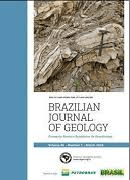
Brazilian Journal of Geology
Empowering Global Geoscientific CollaborationBrazilian Journal of Geology, the flagship publication of the SOC BRASILEIRA GEOLOGIA, has been a beacon of geoscientific research since its inception in 2013. With an ISSN of 2317-4889 and an E-ISSN of 2317-4692, this open-access journal has facilitated the dissemination of high-quality research across various branches of geosciences, making it freely accessible to a global audience since 2014. Hailing from Brazil, the journal proudly holds a Q2 ranking in Earth and Planetary Sciences as of 2023, and ranks #73 out of 195 in Scopus, indicating its growing impact and relevance in the field. The Brazilian Journal of Geology aims to bridge diverse geological studies with interdisciplinary approaches, promoting the understanding and application of geology in addressing contemporary scientific challenges. As it converges research from 2013 to 2024, the journal not only enriches the academic landscape but also serves as a vital resource for researchers, professionals, and students eager to explore the complexities of the Earth and its processes.

ANNALES SOCIETATIS GEOLOGORUM POLONIAE
Unveiling Geological Insights from Poland and the World.ANNALES SOCIETATIS GEOLOGORUM POLONIAE is a distinguished journal published by the Polish Geological Society, focusing on pivotal research in the fields of geology, economic geology, and stratigraphy. With an ISSN of 0208-9068, this journal has established itself as an essential platform for disseminating significant findings and advancements in geological sciences since its convergence in 2008. The journal proudly holds a Q2 quartile ranking in the categories of Economic Geology, Geology, and Stratigraphy as of 2023, indicating its respectable position within the global academic community. Researchers will find its indexed status in Scopus, ranking #138/321 in Geology and showcasing a solid presence in key geological sub-disciplines. While the journal is not open access, it remains a vital resource for professionals and students striving for insight into contemporary geological research. Located in Krakow, Poland, the journal continues to contribute significantly to the understanding of geological processes and resources, making it an indispensable reference for anyone in the field.

Andean Geology
Exploring Geological Wonders of the Andean RegionAndean Geology is a prominent open-access journal, published by the SERVICIO NACIONAL GEOLOGIA MINERVA in Chile, dedicated to advancing the fields of geology, geochemistry, petrology, paleontology, and stratigraphy. Since its inception in 2009, the journal has provided a vital platform for the dissemination of research pertaining to the Andean region and beyond, featuring high-quality articles that contribute to our understanding of earth sciences. With an impressive ranking in the Q2 and Q3 quartiles across multiple categories, it reflects a growing impact in the geological community, evidenced by its status within Scopus rankings. Andean Geology not only supports the academic pursuit of knowledge with its open-access policy but also aims to foster collaboration among researchers and professionals worldwide, ensuring wide accessibility of groundbreaking research and promoting academic engagement. By covering a diverse array of topics relevant to the dynamic field of geology, this journal serves as an essential resource for students, professionals, and scholars dedicated to earth and planetary sciences.
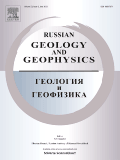
Russian Geology and Geophysics
Catalyzing Discoveries in Geoscience ResearchRussian Geology and Geophysics is a seminal journal published by GEOSCIENCEWORLD that plays a pivotal role in the dissemination of vital research within the realms of Earth-Surface Processes, Geology, and Geophysics. With an ISSN of 1068-7971 and an E-ISSN of 1878-030X, this journal has witnessed a continuous evolution since its convergence in 2007 and is poised to thrive through 2024. While it is not an Open Access journal, it is recognized for its significant contributions to the academic community, holding a respectable Q2 ranking in Earth-Surface Processes and Q3 rankings in both Geology and Geophysics as of 2023. The journal’s impact factors align it within competitive quartiles, marking it as an essential resource for researchers and professionals seeking to stay at the forefront of geological and geophysical sciences. By publishing high-quality peer-reviewed articles, the journal fosters an environment of knowledge sharing and innovation, making it indispensable for students, practitioners, and scholars alike who are dedicated to advancing our understanding of Earth's complex systems.